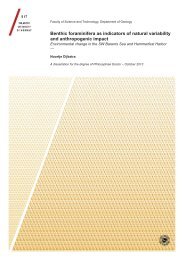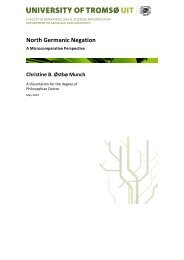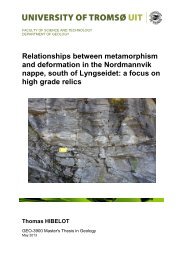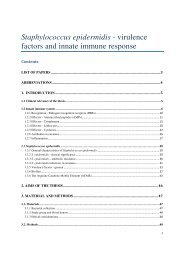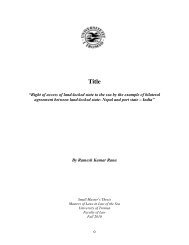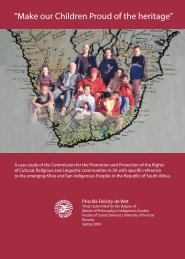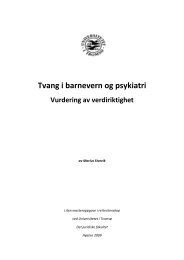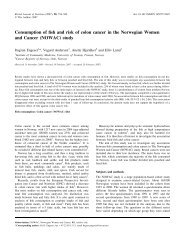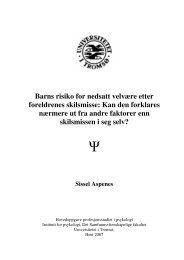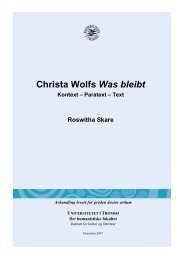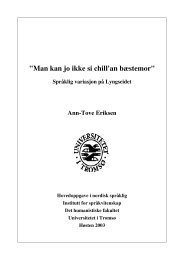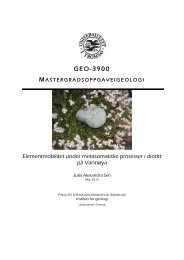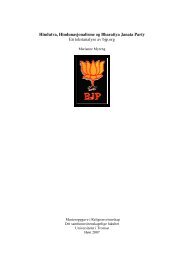Summary of Conference - Munin
Summary of Conference - Munin
Summary of Conference - Munin
You also want an ePaper? Increase the reach of your titles
YUMPU automatically turns print PDFs into web optimized ePapers that Google loves.
individuals and groups are turning current changes to their advantage in a variety <strong>of</strong> ways. It is<br />
important to acknowledge and celebrate this, but without losing sight <strong>of</strong> the fact that, overall, the<br />
developments that have led to the process <strong>of</strong> urbanization have been devastating to indigenous<br />
communities.<br />
A critical question then for this conference is the one posed by Rye: What does all this mean for<br />
development efforts? What can we do, as academics and as international aid organizations? There<br />
were some responses; Saugestad points out the need to continue support for the establishment<br />
<strong>of</strong> indigenous organizations, who can then spearhead their own projects. De Wet calls for better<br />
dissemination <strong>of</strong> information about issues affecting indigenous peoples and about their rights.<br />
Support for such efforts will be crucial for urban indigenous groups. As many participants<br />
noted, this is an ongoing discussion in the midst <strong>of</strong> changing circumstances; involved donor<br />
organizations must be willing to adjust priorities to accommodate the shift.<br />
It is important that this not be done at the expense <strong>of</strong> attention to land and land issues–for this<br />
is one <strong>of</strong> the most urgent and critical issues faced by many indigenous groups today. Though we<br />
do not want to ascribe “victim” status to all urban indigenous, we don’t want to lose sight <strong>of</strong> the<br />
fact that many who have moved to urban areas have done so because it was their only or best<br />
option in the face <strong>of</strong> loss <strong>of</strong> traditional land and / or livelihoods. Where situations like this are<br />
imminent and possibly preventable, and where it is possible to support non-violent resistance to<br />
it, this should also remain a priority for academic and donor assistance.<br />
This conference has brought to the fore the urgent issues <strong>of</strong> urbanization and migration<br />
that confront indigenous peoples everywhere. While the conference itself was not meant to be<br />
conclusive, it has made a very important contribution to the ongoing dialogue.<br />
Jens Dahl, IWGIA, Denmark<br />
The theme <strong>of</strong> the meeting this year had its background in the fact that an increasing number<br />
<strong>of</strong> indigenous peoples live in cities and urban areas. In the near future we will see that in some<br />
countries the majority <strong>of</strong> indigenous peoples will have left their homelands to live in the cities.<br />
However, development assistance to indigenous peoples is primarily being given to indigenous<br />
peoples living in rural areas. This reflects preferences among the public and many NGOs. In<br />
this situation, the Forum meeting focused upon migration and the development <strong>of</strong> identity and<br />
organization among indigenous peoples in cities and urban areas. The Forum is an advisory to<br />
NORAD.<br />
Of the four conference sessions, three were dedicated to the theme and one session on general<br />
issues relating to indigenous peoples in development.<br />
One session focused on the Philippines with two presentations: Geraldine Doco from the<br />
Cordillera Peoples Alliance and Rune Paulsen from Rainforest Foundation Norway. Geraldine<br />
Doco reported on the historical background <strong>of</strong> the strong indigenous movement in the Cordillera<br />
and the urban organizations. Rune Paulsen commented on this presentation.<br />
The second session focused on South Africa. Presentations were given by Jean Burgess,<br />
Ghonaqua KhoeKhoe Peoples, Cape Town; Priscilla De Wet, University <strong>of</strong> Free State; Petro<br />
Esterhuyse, University <strong>of</strong> Free State; and Siv Øvernes showed her film “Street living and<br />
Khoe San identity.” Jean Burgess gave a historical overview <strong>of</strong> the origin and development <strong>of</strong><br />
indigenous identities in relation to factors such as oppression, apartheid, class development and<br />
urbanization. Priscilla De Wet focused on the conscious work to re-construct and reconfirm<br />
indigenous identity in post-apartheid South Africa. Siv Øvernes’ film addressed the same theme<br />
based upon the life <strong>of</strong> an indigenous woman that had lived on the streets <strong>of</strong> Cape Town. Petro<br />
Esterhuyse talked about the endeavours <strong>of</strong> 500 Afrikaners living in the community <strong>of</strong> Orania to<br />
62



